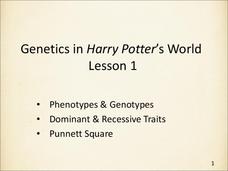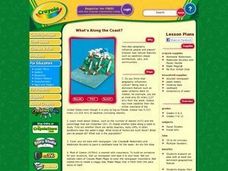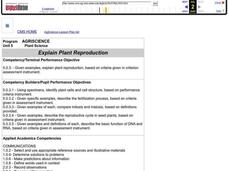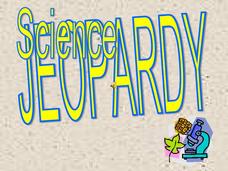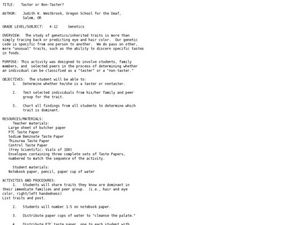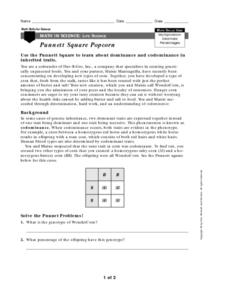Virginia Department of Education
Mendelian Genetics
How did Mendel know which pea plants would demonstrate certain characteristics? Pupils explore the answer this question, among others, as they complete Punnet squares, research dominant and recessive traits, and explore hereditary...
US National Library of Medicine
Genetics in Harry Potter’s World Lesson 1
By the end of Harry Potter and the Deathly Hallows, we know Harry and Ginny get married, but what will their kids look like? This presentation introduces viewers to Punnett Squares and how to use them to determine both dominant and...
Curated OER
Genome: The Secret of How Life Works
What do you have in common with a fruit fly? About 60 percent of your DNA. The resource, divided into two units, is intended for grades four to eight and another for high schoolers. Both units include eight lessons covering the genome as...
Virginia Department of Education
Passing Traits to Offspring
What makes each one of us unique? Lead your class in this exciting and educational activity as you uncover traits that show how each individual is different from another. Pupils explore facts about DNA technology and predict the...
University of Colorado
Punnett Squares with Piebald Deer
Explore the science behind Earth's amazing diversity of life with this lesson plan on genetics. Looking at specific traits in piebald deer, carnations, and roan cattle, young scientists use Punnett squares to determine the possible...
US National Library of Medicine
Monster Genetics Lab
Harness young scientists' knowledge of genetics with an engaging science activity. Students start by flipping a coin to determine the genotypes and phenotypes of two parent monsters, before using Punnett squares to determine the...
Oklahoma State University
Hairy Heredity
Young scholars learn that heredity comes down to the flip of a coin with this cross-curricular math and science lesson. Using smiley faces as a model, students toss coins to determine which dominant or recessive traits will be passed on...
Curated OER
7.012 Genetics Section Problems
A set of phenotypes is listed for mice, flowers, blood type, and plants. For each, biology buffs analyze the percentages of phenotypes in the offspring and then identify the genotypes of the parents. This is a different approach to...
Curated OER
What's Along the Coast?
Students research an area with at least one dominant geographical feature. Then they display their findings in a realistic 3-dimensional presentation. Students also prepare ancillary material to support their project. Finally, they chart...
Serendip
Genetics
A handout on genetic inheritance begins with a reading on alleles and how they can result in albinism. Junior geneticists learn to complete Punnett squares and participate in a coin toss simulation of allele pairing. They also learn...
Curated OER
"Easter" Egg Genetics
Using plastic Easter eggs to represent parent phenotypes, genetics enthusiasts simulate the passing of alleles. They record the phenotype of each half of the egg, one representing the mother's and one representing the father's. They...
Curated OER
Plant Reproduction
Students plant seeds in order to investigate and explore the questions: "How do seed companies develop varieties of plants?" and "What is the ideal plant?" Students will study related vocabulary and sketch seeds as they emerge. Students...
Curated OER
Raven Chapter 13 Guided Notes: Patterns of Inheritance
In this short space, it would be impossible to describe the breadth of this seven-page genetics worksheet. Geared toward AP or college biology learners, they explore not only the basic vocabulary and concepts, but also the Law of...
Curated OER
genetics
Parts of the cell as well as genetic material begin this presentation. As the slides continue, there are explanations of the main terms used in genetics. The structure of genetic material, chromosomes, and replication are summarized....
Curated OER
Science Jeopardy
Make reviewing evolution, cell division, genetics, cell structure, and scientific method more fun! Science Jeopardy allows teams to choose a category for the question they will address. If you complete the entire game, learners will have...
Curated OER
Taster of Non-Taster?
Students investigate their own inherited traits by using taste papers. In this genetic traits instructional activity, students test their ability to taste various substances, which is determined by inherited genetic traits. They take...
Curated OER
Zork Genetics
In this genetics worksheet, students use an imaginary species and a list of genetic traits and the alleles that code for each trait to determine the genotype and phenotype probabilities of offspring. Students complete nine monohybrid...
Curated OER
Heredity Worksheet #2
For this genetics worksheet, students use a diagram showing the genetic offspring of plants with different types of seeds to answer 4 short answer questions. Then students determine the traits of offspring of different crosses in 1...
Curated OER
Genetics Basics
For this basics of genetics worksheet, students review the concepts of genetic inheritance by writing the alleles for genetic traits inherited in offspring. They identify dominant and recessive traits given allele pairs, answer five...
Curated OER
Punnett Square Popcorn
In this genetics worksheet, students use the Punnett Square to learn about dominance and codominance in inherited traits. This worksheet has 1 short answer question and 6 problems to solve.
Curated OER
Mendel Pea Plants
In this Mendelian genetics activity, students answer a variety of questions about Mendel's experiments and discoveries and they practice determining probability of outcomes in pea plants.
Curated OER
Mendel's Laws of Heredity
In this heredity worksheet, students will review the work Mendel did on predicting how traits were passed down from generation to generation. Then students will review monohybrid and dihybrid crosses and Punnett squares. This worksheet...
Curated OER
Mendelian Inheritance of Human Traits
For this Mendelian inheritance worksheet, learners will use a pedigree to complete 4 short answer questions about recessive and dominant traits. Then students will create a Punnett square. Finally, learners will match 5 genetic disorders...
Curated OER
Life Has A History
In this biology worksheet, students identify and match various classes of species found today. Then they explain why biodiversity exists today on earth and define evolution. Students also describe who a paleontologist is and what they do.



